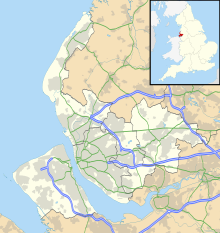Speke Airport
| Liverpool John Lennon Airport | |||||||||||
|---|---|---|---|---|---|---|---|---|---|---|---|
 |
|||||||||||
 |
|||||||||||
| Summary | |||||||||||
| Owner | Peel Airports | ||||||||||
| Operator | Liverpool Airport PLC | ||||||||||
| Serves | Liverpool, Merseyside, Cheshire, Shropshire and North Wales | ||||||||||
| Location | Speke, Liverpool | ||||||||||
| Elevation AMSL | 81 ft / 25 m | ||||||||||
| Coordinates | 53°20′01″N 002°50′59″W / 53.33361°N 2.84972°WCoordinates: 53°20′01″N 002°50′59″W / 53.33361°N 2.84972°W | ||||||||||
| Website | liverpoolairport.com | ||||||||||
| Map | |||||||||||
| Location in Merseyside | |||||||||||
| Runways | |||||||||||
|
|||||||||||
| Statistics (2016) | |||||||||||
|
|||||||||||
| Passengers | 4,778,939 |
|---|---|
| Passenger change 15–16 |
|
| Aircraft Movements | 62,441 |
| Movements change 15–16 |
|
Liverpool John Lennon Airport (IATA: LPL, ICAO: EGGP) is an international airport serving North West England. On the outbreak of World War II the airport was operated by the RAF and known as RAF Speke. The airport is within the City of Liverpool on the banks of the estuary of the River Mersey some 6.5 nautical miles (12.0 km; 7.5 mi) south east of the city centre. The airport is named after Liverpudlian musician John Lennon of The Beatles. Scheduled domestic, European and North African services are operated from the airport.
Between 1997 and 2007 the facility was one of Europe's fastest growing airports, increasing annual passenger numbers from 689,468 in 1997 to 5.47 million in 2007. Despite passenger numbers having decreased to just over 4.8 million in 2016, this was an 11.1% increase on the 2015 total, making it the 12th busiest airport in the UK. The CAA Public Use Aerodrome Licence Number is P735, that allows flights for the public transport of passengers and flying instruction.
Built in part of the grounds of Speke Hall, Liverpool (Speke) Airport, as the airport was originally known, started scheduled flights in 1930 with a service by Imperial Airways via Barton Aerodrome near Eccles, Salford and Castle Bromwich Aerodrome, Birmingham to Croydon Airport near London. The airport was officially opened in mid-1933. By the late 1930s, air traffic from Liverpool was beginning to take off with increasing demand for Irish Sea crossings, and a distinctive passenger terminal, control tower and two large aircraft hangars were built.
...
Wikipedia

